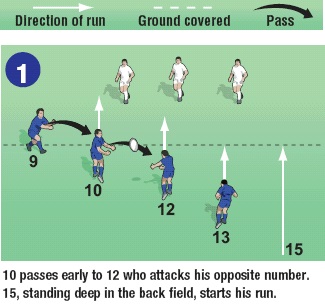I used to play rugby. This is probably the sport which is most geared to team play. Even in football you can be an individually brilliant player but in rugby you are nothing without the rest of the team. Team play is a key part of the game: linking with the other players is an assumed part of the skillset.

(This diagramme from RugbyCoachWeekly shows how important linking between team members is in rugby.)
Academia is very different. Although my work is mainly
teaching, and teaching in a team rather than as a sole operator, there is a
strong individualistic ethos. In teaching collaboration is made more difficult because
there is no convention for acknowledging teaching materials when these are
shared, as there is in research and publication. There's no incentive to share good ideas about teaching.
Managers seem to expect teamwork to happen out of thin air. For example, since students are thought to be on Facebook a lot, there is an expectation that they will be happy to go on Forums to chat. However students are shy and anxious about putting themselves forward on a module forum, they frequently talk about fearing they will be judged or that their ideas might be ‘stolen’.

(In the article which this image illustrates, the author talks about how to get an ad better placed in Facebook - showing how hard many people work to establish an apparently effortless community feeling online.)
John Seely Brown (The Open University 2017) mentions our lack of trust in others as a problem preventing working as if in a ‘studio’.
Trust has to be built, it doesn’t just appear out of nowhere. Facebook relies on the trust people have built up offline with the people they ‘friend’ online. Some way needs to be found to build relationships between students so that they trust each other enough to post together.
Some students have spoken about picture-avatars as a means to do this. I don’t use one myself, though, for reasons I will write about in a different blogpost.
ReferenceThe Open University, 2017. 'Open Architectural Studio' [Video] H818 The networked practitioner. Available at: https://learn2.open.ac.uk/mod/oucontent/view.php?id=1097701§ion=4.2 (accessed 20/09/2017).